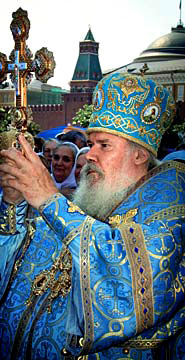Patriarch Alexy II, head of Russian Orthodox Church, died

Russia’s first post-Soviet Orthodox leader died at his residence outside Moscow, a church spokesman said. The cause of death was not given, although the 79-year-old had been in poor health for some time and diplomats in Moscow have said that he was suffering from cancer.
Alexiy II was elected head of the Orthodox Church in 1990 and oversaw its restoration to a dominant role in Russian society thanks to open support from the Kremlin under Boris Yeltsin and in particular Vladimir Putin, the former KGB officer.
Patriarch Alexiy’s links with the Kremlin were clouded by allegations that he himself had been a long-serving KGB agent codenamed “Drozdov” (the thrush), who had been awarded a “certificate of honour” for his service by the Soviet authorities in 1988. He was accused of providing information on dissident priests, and the KGB even sent him to England in 1969 on a mission with a church delegation.
Mr Putin called the Patriarch’s death “a very tragic and sorrowful event”, adding: “Not only was he a prominent figure in the history of the Russian Orthodox Church, but also a great statesman.”
President Medvedev, who is in India, cancelled a planned visit to Italy to return to Russia for the funeral.
In a statement issued by the Kremlin, he said: “A very grievous event has happened in the life of this country, our society – Patriarch of Moscow and All Russia Alexiy II has died. Not only was he an outstanding religious figure and true spiritual leader, he was also a great citizen of Russia.”
As Patriarch, Alexiy II oversaw the restoration of the Church’s authority in Russia after the fall of Communism as churches were rebuilt and reopened across the country. He was seen as a unifying national figure,his moral strictures and benevolent appearance offering certainty at a time of extreme economic hardship and political upheaval.
Alexiy II also presided over a reunification ceremony at Christ the Saviour cathedral in Moscow last year that ended an 80-year schism with the Orthodox faithful whose families had fled Russia after the Bolshevik Revolution in 1917.
His death after an 18-year reign is likely to prompt an outpouring of grief in Russia, which has experienced a profound religious revival since the collapse of the Soviet Union. State television screened images from Alexiy’s life, accompanied by the sound of tolling church bells, immediately after the announcement of his death.
The Church called an emergency session of the Holy Synod for Saturday to organise the Patriarch’s funeral service. A temporary Patriarch will also be elected at that meeting, Bishop Mark of Yegoriyevsk, a Church spokesman, told Interfax news.
A new Patriarch must be elected by a Church Council no later than six months after the position becomes vacant. Former Soviet leader Mikhail Gorbachev told Interfax news that the Alexiy II’s death had left him “so shocked that it is very hard for me to find words on the spot.” He added: “I respected him deeply.”
The 15th Primate of the Russian Orthodox Church was born Alexei Ridiger in independent Estonia in February 1929, the son of a Russian emigré priest. He trained at the Leningrad Theological Seminary during Stalin’s rule, graduated in 1949 and was ordained as a priest a year later.
He served in his native Estonia, now absorbed into the Soviet Union, rising to become Bishop of Tallinn and Estonia in 1961. He became deputy chairman of the Department for External Church Relations in the Moscow Patriarchate shortly afterwards.
By 1964, under Brezhnev, then Archbishop Alexiy was appointed Chancellor of the Moscow Patriarchate, a position he held until 1986. Soviet authorities at this time were jailing dissident priests and maintaining a tight grip on the Orthodox Church, but Alexiy rose to the rank of Metropolitan.
In 1986, soon after Mr Gorbachev came to power, Alexiy was appointed Metropolitan of Leningrad and Novgorod. He was elected Patriarch in June 1990, partly because he was seen as more in tune with Mr Gorbachev’s modernising reforms than his main rival, who also had strong ties to the Communist regime.
The original Christ the Saviour cathedral had been destroyed by Stalin and replaced with a swimming pool. But Patriarch Alexiy II oversaw the building of an exact replica with help from President Yeltsin and the influential Mayor of Moscow, Yuri Luzhkov.
Church finances were boosted by income from customs concessions granted by the Russian government in the 1990s. But Patriarch Alexiy’s close alliance with President Putin, who openly professed his Orthodox faith, greatly increased the Church’s influence in Russia’s political and social life.
The Orthodox faith has come close to being the official religion, with schools encouraged to teach its precepts. President Medvedev and his wife Svetlana were shown on national television receiving a blessing from the Patriarch during the President’s inauguration at the Kremlin in May, even though the Russian state is officially secular.
Relations with the Roman Catholic Church remained touchy, however, and the Patriarch consistently opposed any visit to Russia by Pope John Paul II and his successor Benedict XVI. He accused Rome of “proselytism”, a suspicion fuelled by the creation of four Catholic dioceses in Russia.
– Source : Timeonline




